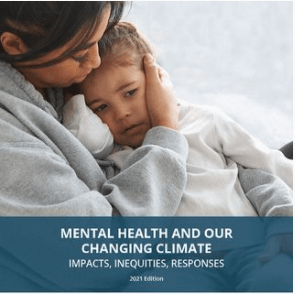A Solution for Climate Anxiety: Spending More Time in Nature
This post is part of a Mental Health Awareness Month blog series that highlights “Closer Look” perspectives from the 2021 edition of Mental Health and Our Changing Climate. This is a reprint from the report.
A Solution for Climate Anxiety: Spending More Time in Nature
There is substantive science behind what many intuitively understand: spending time in nature makes us feel better. The Children & Nature Network has long advocated for the mental health benefits of time outdoors, which include a sense of calm and restoration; measurable reductions in stress, anxiety, and depression; and enhanced mood, resilience, and ability to cope with adversity (Vanaken, 2018; Tillmann, 2018). But what do you do when the place that should offer respite is itself a source of anxiety?
We know that many young people are grappling with the impact that climate change will have on their lives. Low-income and Black, Indigenous, and other communities of color are often the most vulnerable to the worst impacts of climate change such as flooding, drought, fire, and extreme heat. However, studies also show that nature’s benefits are relatively greater for those who are negatively impacted by economic disadvantage, systemic racism, trauma, opportunity gaps, and other challenges (Alderton, 2019; Islam, 2020)
Just being out in nature can mitigate some of children’s anxiety about climate change. There is increasing evidence that regular connection to nature helps children — and all of us — feel calmer and less stressed. When children become overloaded by adverse experiences, their stress response systems pump out cortisol, which in itself, without recovery, negatively impacts sleep, metabolism, and physical health overall. A stress response system in high gear decreases children’s ability to focus and increases the likelihood of illness.
A 2020 review of peer-reviewed studies conducted by Meredith et al., found that spending as little as 10 to 20 minutes in nature daily may prevent stress and mental health strain for people between the ages of 18 and 22. Physiological markers of reduced stress included decreased heart rate and blood pressure; psychological markers included less depression, anxiety, and fatigue — and increased vigor, positive affect, and feelings of calm.
We know that hands-on engagement in the outdoors allows children to experience these benefits and develop a deep love of the natural world. Engaging children even in small actions can help them feel like they are part of the solution. Planting pollinator-friendly plants, picking up litter, or creating compost from food waste and using it in a garden are all climate-friendly ways for children to engage with the natural world. Even the very young can take positive actions for themselves, their communities, and the environment
As a global community, we are realizing now more than ever how much we need nature in our daily lives. Now is the time to invest in ensuring that equitable access to healthy, outdoor green spaces exist in every community, to support health and well-being, and to build the resiliency of people and the planet.
Read the report, HERE. And share on Social!
About ecoAmerica
ecoAmerica builds institutional leadership, public support, and political resolve for climate solutions in the United States. We help national mainstream organizations elevate their climate leadership, providing them strategy, tools and resources to: demonstrate visible climate leadership, empower climate literacy, engage all constituents, and build collective action and advocacy. We help our partners transform into national climate leaders who inspire others on solutions. ecoAmerica.org
Want the convenience of getting ecoAmerica’s newsletter and blog in your inbox? Subscribe today!
Join ecoAmerica in the call for more ambitious and just climate action. Sign the MomentUs statement today.
